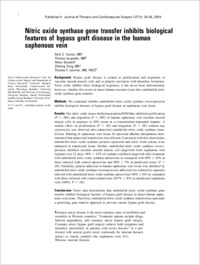Nitric oxide synthase gene transfer inhibits biological features of bypass graft disease in the human saphenous vein
- Tanner, Felix C. Cardiovascular Research, Clinic for Cardiovascular Surgery and Department of Clinical Research, University Hospital, Bern, Switzerland
- Largiadèr, Thomas Cardiovascular Research, Physiology Institute, University Zürich-Irchel and Division of Cardiology, University Hospital, Zürich, Switzerland
- Greutert, Helen Cardiovascular Research, Clinic for Cardiovascular Surgery and Department of Clinical Research, University Hospital, Bern, Switzerland
- Yang, Zhihong Physiology Institute, University of Fribourg, Fribourg, Switzerland
- Lüscher, Thomas F. Cardiovascular Research, Physiology Institute, University Zürich-Irchel and Division of Cardiology, University Hospital, Zürich, Switzerland
-
28.01.2004
Published in:
- Journal of Thoracic and Cardiovascular Surgery. - 2004, vol. 127, no. 1, p. 20-26
English
Background Bypass graft disease is related to proliferation and migration of vascular smooth muscle cells and to platelet activation with thrombus formation. Nitric oxide inhibits these biological responses; it has never been demonstrated, however, whether this occurs in intact human vascular tissue after endothelial nitric oxide synthase gene transfer. Methods We examined whether endothelial nitric oxide synthase overexpression inhibits biological features of bypass graft disease in saphenous vein tissue. Results The nitric oxide donor diethylenetriamineNONOate inhibited proliferation (P< .001) and migration (P< .001) of human saphenous vein vascular smooth muscle cells in response to 20% serum in a concentration-dependent manner. A similar effect on proliferation (P< .05) and migration (P< .05) without any cytotoxicity was observed after adenoviral endothelial nitric oxide synthase transfection. Staining of saphenous vein tissue for placental alkaline phosphatase demonstrated that adenoviral transfection was efficient. Consistent with this observation, endothelial nitric oxide synthase protein expression and nitric oxide release were enhanced in transfected tissue. Further, endothelial nitric oxide synthase overexpression inhibited vascular smooth muscle cell outgrowth from saphenous vein explants over 21 days; 48% ± 12% of explants exhibited outgrowth after treatment with endothelial nitric oxide synthase adenovirus as compared with 69% ± 10% in those infected with control adenovirus and 90% ± 5% in uninfected tissue (P< .05). Similarly, platelet adhesion to human saphenous vein tissue was inhibited by endothelial nitric oxide synthase overexpression; adhesion was reduced in segments infected with endothelial nitric oxide synthase adenovirus (58% ± 6%) as compared with those infected with control adenovirus (107% ± 8%) or uninfected saphenous vein (100%; P< .05). Conclusions These data demonstrate that endothelial nitric oxide synthase gene transfer inhibits biological features of bypass graft disease in intact human saphenous vein tissue. Therefore, endothelial nitric oxide synthase transfection represents a promising gene transfer approach to prevent venous bypass graft disease.
- Faculty
- Faculté des sciences et de médecine
- Department
- Département de Médecine
- Language
-
- English
- Classification
- Medicine
- License
-
License undefined
- Identifiers
-
- RERO DOC 4889
- DOI 10.1016/j.jtcvs.2003.07.021
- Persistent URL
- https://folia.unifr.ch/unifr/documents/299568
Statistics
Document views: 167
File downloads:
- Texte intégral: 270
